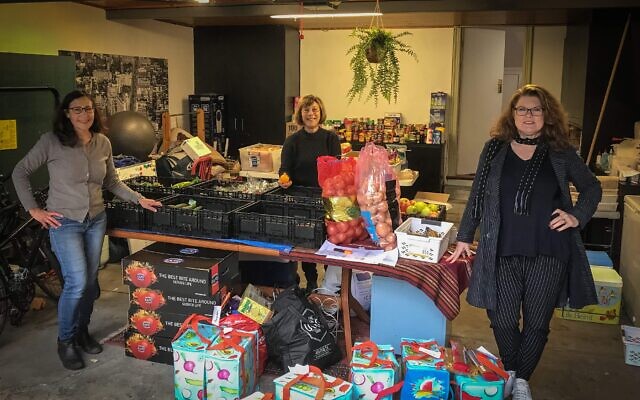Bringing relief and a hand up to refugees
The Project Dignity Crisis Relief program was created to provide support to refugee students and their families who are seeking asylum in Australia.

RAHMAT* was 14 years old when he arrived in Australia. But his first encounters of this new land were not experienced as he trudged through an airport terminal – rather, he arrived upon the shores in a leaky boat.
His first 10 months were spent on Christmas Island, and the next three at Leonora detention facility in Western Australia.
Rahmat and his parents are Hazara people, a persecuted ethnic minority from Afghanistan. Together, they sought asylum.
In the process, they were separated from Rahmat’s four siblings. The Red Cross is still searching for them.
Now aged 22, the past eight years have not been without enormous challenge for Rahmat and his family – the coronavirus pandemic, one of the greatest.
“Asylum seekers do not qualify for any government funding including JobSeeker or JobKeeper programs, and Medicare is limited,” he explained.
“We have people who are becoming really disenfranchised, marginalised, and severely disadvantaged.”
As such, the assistance provided by Temple Beth Israel’s (TBI) Project Dignity COVID-19 Crisis Relief Program to the already vulnerable refugee community has been crucial.
So far, the program has supported more than 160 asylum seeker students and their families with money, fresh fruit and vegetables, masks, non-perishable food and toiletries, and 50 volunteers have cooked over 2000 meals that have been distributed directly to their homes.
The project has joined other organisations – Hope Co-Op, the Salvation Army’s Asylum Seekers and Refugees Service in Brunswick, and Deakin University’s CREATE (Centre for Refugee Employment, Advocacy, Training and Education) with the aim of making support as widespread as possible.
“To date the response has been incredibly heartening,” said TBI Project Dignity coordinators Nicole Brown, Elly Brooks and Karen Dunwoodie.
“The recipients are appreciative of not only the nutritious food, but the awareness that we as a community care about them.”
And as a recipient touched by the support of the program himself, Rahmat reflected, “It means a lot. While I’m from another faith, it tells me that humanity doesn’t consider religion, language or skin colour.
“If you see someone who needs help, you just help them, and that’s the way it works with TBI Project Dignity. It is something that is really impactful and goes a long way.”
But this is not Rahmat’s first connection with the Jewish community.
Born in a refugee camp in southern Iran, Rahmat regularly witnessed visits of volunteers from international aid organisations.
“They would ask, what would you like? I said, books.”
He was 10 years old, and these books were the first time he received education.
Rahmat recalled one book he received that was about the Holocaust. He immediately saw similarities between the treatment of Jews in Europe, and the Hazara in Afghanistan.
He then discovered one volunteer was Jewish. “We spoke and he said to me, we share the same history and the same struggle to survive. We believe in the same God.
“It was impactful because you learn the lies that are being spread by clergy inside the mosque are not true. If we don’t have interaction, we don’t hear each other’s stories.”
It was a lesson that stayed with him.
Four years later, when Rahmat arrived in Melbourne with his parents, they were met by a rabbi and a priest who asked how they could help.
“They first thing my dad asked was how to get me into a school.”
The rabbi and priest found Rahmat a college – and a scholarship. Despite never having been to school, nor knowing a word of English, Rahmat dedicated himself to his studies, ensuring he completed his VCE – and he did – with an ATAR of 93.85.
“I couldn’t believe myself!”
While Rahmat wanted to study optometry at university, he hit another obstacle. Refugees are not eligible to receive HECS.
“But the priest said, just apply, and leave it to God.”
Not only was Rahmat accepted at Deakin University, but when his story was learned, he was offered a scholarship.
“I owe my success to that rabbi and priest,” he enthused.
Having almost completed his Masters of Optometry, Rahmat has been offered the opportunity to study Medicine – his ultimate dream. But he must search for a way to make it a reality, again his status preventing him from a Commonwealth-supported place.
“But I’ve been really fortunate, and I consider myself lucky,” he said.
“In my culture, we say if God gives us pain, he will also give us the patience to endure that pain. Sometimes we believe this is the journey to make us a better person for the community.”
*Rahmat’s real name has been changed to protect his identity.
To volunteer for the TBI Project Dignity COVID Crisis Relief Program contact Elly Brooks on 0409 002 485. Donations can be made at www.tbi.org.au/project-dignity-crisis-relief.

comments